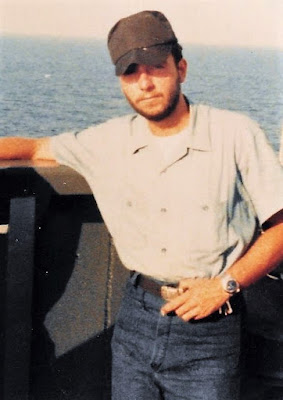Today is National Vietnam Veteran’s Day.
Back in 1970 and 1971, I was an 18 and
19-year-old sailor stationed aboard the USS Kitty Hawk as the aircraft carrier launched combat aircraft against North Vietnam from “Yankee Station” in the Gulf of Tonkin during
the final years of the Vietnam War.
I recall that nearly every pilot, intelligence
officer and seasoned military man I spoke to aboard the carrier was disgusted with
the conduct of the war.
They thought we should win it.
If only, I was told, we were allowed
to unleash the full power of the aircraft carrier, the North Vietnamese would
quickly surrender.
I agreed then and now, after all these
years in which I’ve interviewed many soldiers, airmen, sailors, Marines and CIA
officers who fought in the war, I still agree.
We could have – we should have - won the
Vietnam War.
Militarily, we did win, as we never lost
a battle over company strength during our entire time there, and when the North
Vietnamese defeated the South Vietnamese in 1975, there were no American combat
troops in the country.
We lost the war only in the sense that America lacked a political will to go all out and defeat the communists.
If only Ronald
Reagan had been the president in the 1970s.
James
Roberts, the president of the American
Veterans Center, offers a piece in the Washington Times on how the Vietnam War
was in fact winnable.
In the summer of 1967, Air
Force Col. Robin Olds (later brigadier general) returned to the U.S. following
a tour of duty in Vietnam.
Olds had been an ace pilot in World War 11 and achieved fame in Vietnam for his
bravery, Hollywood good looks and strategic and tactical brilliance.
Invited
to the White House to brief President Johnson, Olds said,
“Mr. President, get us out of this G…damned war.”
When
LBJ asked how, Olds replied, “Win it.”
“Win
it” probably sounds delusional in today’s world where the prevailing opinion is
that the Vietnam War
was “unwinnable and irredeemable,” in the words of documentary producer Ken
Burns. A lost cause from the beginning.
In
2005, Gen. Andrew J. Goodpaster, World War 11 hero, NATO commander, West Point superintendent,
staff secretary to President Eisenhower and deputy U.S. commander in Vietnam from
1968-69, was
asked his opinion about Vietnam. He answered
emphatically that the war was winnable (an opinion shamed by most Vietnam veterans,
in my experience).
No offense, Mr. Burns, but I
agree with Goodpaster. And with President Reagan, who called Vietnam “a noble
cause.”
The
cause and the American forces who prosecuted the war (while never losing a
battle) were quite simply betrayed by the political leadership in Washington,
beginning with President Johnson, aided by the
civilian leadership at the Pentagon, led by Defense Secretary Robert McNamara,
who were in turn abetted by an increasingly corrupt news media and many craven
military leaders in the Pentagon who knew and said privately what was needed to
win the war, but were dissuaded from speaking out publicly (or resigning in
protest) by the lies, false promises and promotions proffered by the civilian
leadership.
The
result was the catastrophe that unfolded in April 1975, when the North
Vietnamese army invaded and conquered South Vietnam, producing the indelible
images of helicopter evacuations from the roof of the U.S. embassy in Saigon,
plus the accompanying tragedy of tens of thousands of South Vietnamese refugees
drowning at sea as they tried to escape, hundreds of thousands of South
Vietnamese interned in concentration camps, and more thousands murdered by the
communist regime; not to mention the more than 2 million people in neighboring
Cambodia tortured and liquidated by the psychopathic Pol Pot regime. Domestically, the Vietnam War poisoned the political atmosphere in the U.S., helped
create a hostile and cynical press corps, and fostered a loss of confidence in
American institutions that persists to this day.
… When Col.
Olds told LBJ to “win the war”: I think he meant that he should use the full
resources of the United States to bring the war to a swift and victorious
conclusion, which is to say ensuring an independent South Vietnam.
You can read the rest of the
piece via the below link:
https://www.washingtontimes.com/news/2021/mar/26/the-vietnam-war-was-winnable/
You can also read my
Counterterrorism magazine on the lessons of the Vietnam War via the below link:
Paul Davis On Crime: My Piece On The Vietnam War And The Lessons Learned For Iraq, Afghanistan And The War On Terrorism




































